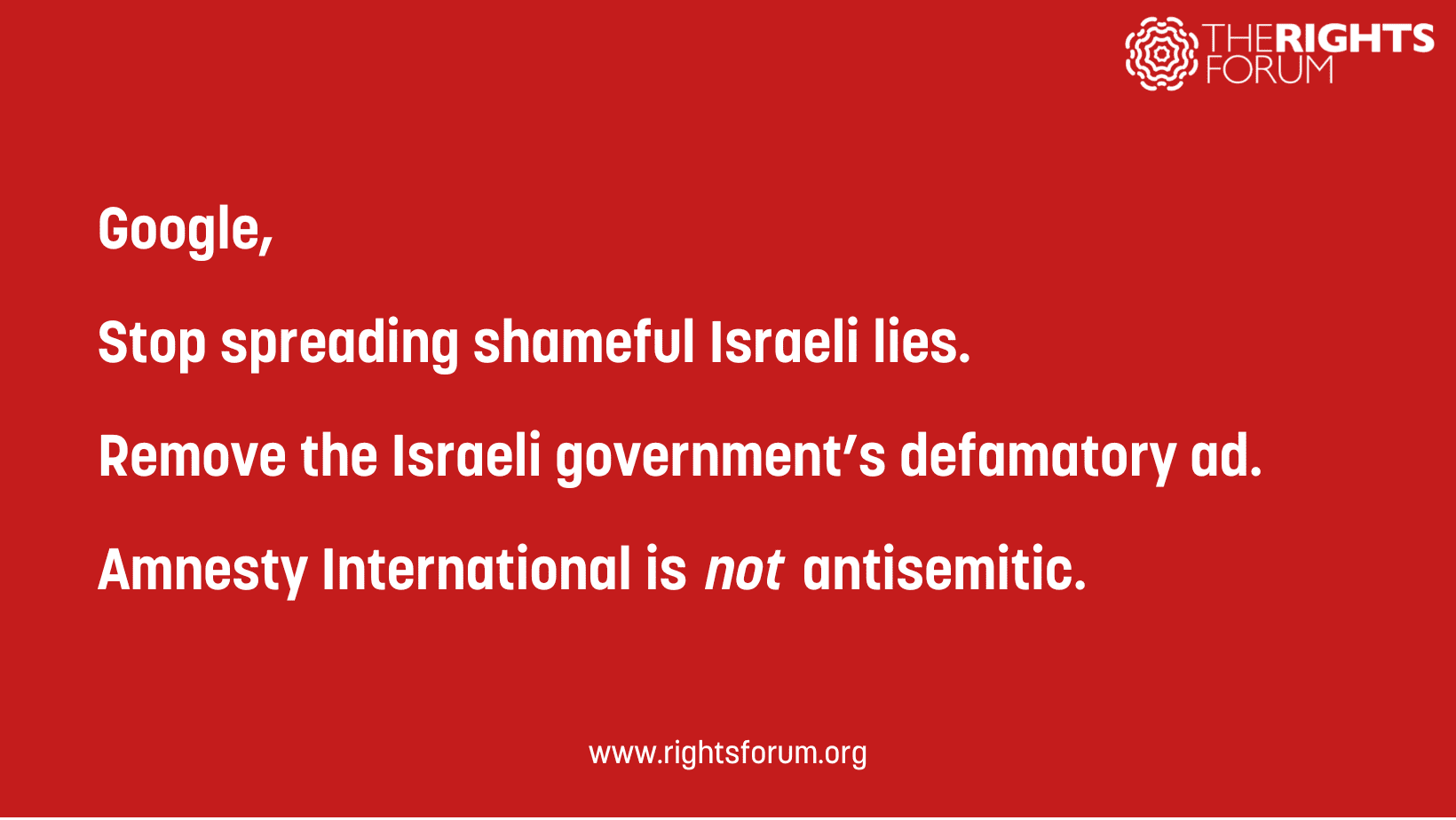In an ad on Google, Israel accuses Amnesty International of having a “hostile, anti-Israel and anti-Semitic agenda”. It is an outrageous piece of slander that Google should never have allowed.

Enter the search term “Amnesty International” on Google and the first of millions of results you will see is an advertisement. Not a promotional annonce from Amnesty itself, but an ad from the Israeli government. And it is anything but promotional.

“The true face of Amnesty: Amnesty ignores human rights” is still the friendliest headline under which the ad appears on Google. Several other headlines have circulated, branding Amnesty as “obsessive”, “hostile”, “anti-Israel” and even “anti-Semitic”.
Those who click on the ad land on a webpage of Israel’s Foreign Ministry. In a short text, the ministry accuses Amnesty of pursuing a “hostile, anti-Israel and anti-Semitic agenda” under the cover of being a human rights organization. Behind the “mask of humanitarianism” is allegedly a shady organization that seeks to “demonize and delegitimize” Israel with lies and outrageous reports, meanwhile abandoning to their fate all kinds of populations in dire need of humanitarian support and protection.
It is highly unusual for a government to devote an advertisement to a human rights organization. And downright startling when it is a mendacious and extremely hostile pamphlet designed to demonize and delegitimize that organization. A government that publicly portrays one of the world’s most respected human rights organizations as a lurid club of anti-Semites is guilty of slander – an offense punishable in many countries.
Equally startling is that Google accepted the ad. Does the company have no rules to which ads must conform? Does it know no moral boundaries? Does it really think that the baseless vilification of a human rights organization is acceptable? By an occupying regime, moreover, in response to Amnesty’s equally justified and important criticism?
The Rights Forum does not think so. We believe that companies should refuse such toxic and inflammatory ads as a matter of principle and with explicit reasons, instead of helping to spread the controversy. We call on Google to remove the ad, and feel it owes Amnesty public accountability and a deep apology.
This is all the more important since Amnesty is not the only target attacked by Israel in this way; the Amnesty case is a symptom of a deeper malady. Israel conducts similar campaigns against the UN, the International Criminal Court and ice cream maker Ben & Jerry’s, among many others. It wages a furious battle against every obstacle that stands in the way of its illegal occupation and colonization of Palestinian territory, in the same aggressive way as it maintains the occupation.
That it frequently directs its arrows at institutions and organizations that embody justice and human rights is no wonder. And it does not stop at demonizing and delegitimizing alone. Human Rights Watch’s Israel/Palestine director was expelled from the country in 2019. In 2020, the 15 employees of the UN Human Rights Office in Israel had to leave the country. Israeli human rights organizations also face political pressure and restrictions.
The Israeli military regime’s closure of the offices of seven Palestinian civil society and human rights organizations last August fits the same pattern. Like Amnesty, they were, according to Israel, engaged in shady activities – “terrorist activities” in this case –, behind a humanitarian mask. That suspicion was a manufactured pretext to roll up the organizations, thereby both silencing critical voices in occupied territory and disrupting a pillar of Palestinian society. The organizations continue their work as best they can, aware that more Israeli measures are hanging over their heads.
Exactly one year ago Google was also discredited, this time for a project it is carrying out together with Amazon on behalf of the Israeli government. This “Project Nimbus” provides for the development and delivery of technology that, according to employees of the companies, can be used by the Israeli military and government to deepen the repression of the Palestinians. In an open letter in The Guardian nearly four hundred employees called for the project to be abandoned.
In support of that call, American organizations Jewish Voice for Peace (JVP) and MPower Change launched the No Tech for Apartheid campaign. They urge companies to respect human rights and their own ethical standards. More than 50 international organizations have since joined the campaign and nearly 45 thousand people have signed petitions to Google and Amazon.
Within Google and Amazon, opposition to the project has continued to grow, leading to a sharp backlash from Google leadership. In late August, Ariel Koren, the (Jewish) face of the opposition, announced she had been forced to resign by Google. In a statement and an interview in Dutch quality newspaper NRC, she describes how she was faced with the choice of moving to São Paulo, Brazil, or leaving the company, outlining a corporate culture in which unwelcome opinions are suppressed:
Google systematically silences Palestinian, Jewish, Arab, and Muslim voices concerned about Google’s complicity in violations of Palestinian human rights.
On September 9, Google and Amazon employees in San Francisco, New York, Seattle, Durham and other American cities demonstrated against Project Nimbus. Last week, Google, which until then had maintained that Nimbus could have no evil military applications, acknowledged that the Israeli military does have access to the new technology, according to the Twitter account Workers Against Nimbus.